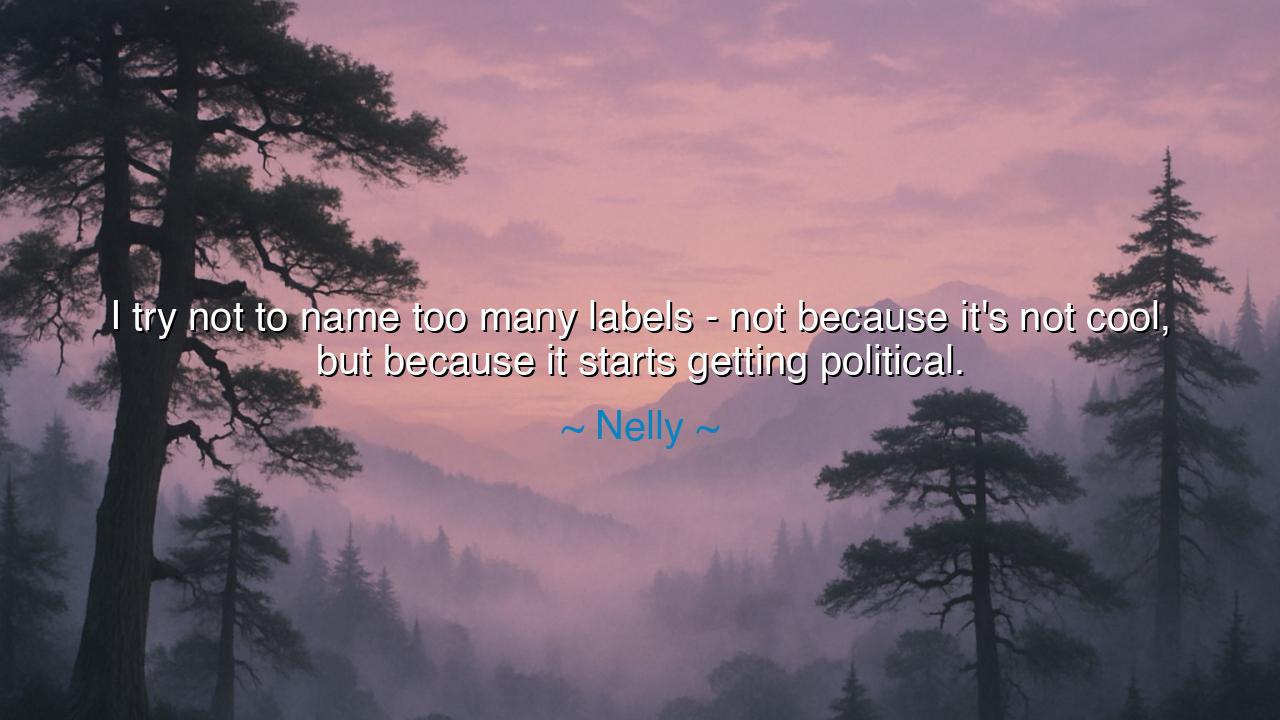
I try not to name too many labels - not because it's not cool
I try not to name too many labels - not because it's not cool, but because it starts getting political.






"I try not to name too many labels - not because it's not cool, but because it starts getting political." – Nelly.
In these words, Nelly speaks to the inherent complexity of identity and the power of labels. Labels, as Nelly points out, are not inherently bad or undesirable, but when overused, they can lead to divisions and complications that move beyond personal choice into the realm of politics. This cautionary statement draws attention to the ways in which labels, whether in fashion, race, or status, can be used to create distinctions between people. What begins as a tool for self-expression can, in time, become a tool for division, separating people into groups based on characteristics that may or may not reflect their true essence.
The ancient philosophers were keenly aware of the power of labels to shape human interaction and society. In the teachings of Socrates, we find a deep concern with how language and labels influence our perceptions of the world and one another. Socrates would often challenge the meanings of terms used in conversation, recognizing that what we name something—be it virtue, justice, or truth—can drastically alter how we perceive it. Labels, though seemingly neutral, carry with them assumptions, biases, and expectations that can cloud the true understanding of a person, an idea, or a situation. Like Nelly, Socrates would caution us to be wary of attaching too many labels to ourselves or others, for they may restrict the depth and breadth of our interactions and understanding.
Consider the story of Alexander the Great, whose identity as a conqueror and emperor was often defined by labels such as "warrior" and "king." These labels defined how he was perceived by others, yet they also confined him to a certain path, one focused on military dominance rather than peace or wisdom. Had he been more open to understanding his identity beyond the confines of those labels, he may have been able to shape his legacy differently. This speaks to the importance of recognizing that labels can both define and limit us. Just as Alexander was seen primarily through the lens of conquest, we too may become constrained by the labels that others place upon us—or that we place upon ourselves.
Labels, as Nelly alludes to, also have the potential to become political. In the ancient world, the idea of identity politics was not a modern invention. Leaders like Julius Caesar understood that how people were labeled—by their class, citizenship, or loyalty—had a profound impact on their power and influence. Labels were often used strategically to build alliances or create divisions. Nelly's caution about labels turning political is a recognition of the power dynamics that come with identity. When labels become associated with certain beliefs or affiliations, they cease to be personal choices and instead become weapons in larger societal struggles. What begins as a simple form of self-expression can quickly transform into a statement of loyalty or opposition, depending on the context.
At the core of Nelly’s words is the notion of authenticity—the desire to be seen for who one truly is, beyond the limitations of external labels. The ancient Stoic philosophers, such as Epictetus, believed that true freedom comes from the ability to live authentically, free from the influence of others' judgments or labels. Epictetus often spoke of the importance of internal values—virtues like wisdom, courage, and justice—over external perceptions. He would likely agree with Nelly’s desire to avoid excessive labeling, understanding that when we are defined by too many external factors, we lose the ability to express our true selves.
The lesson here is one of awareness and intentionality. In our own lives, we must be mindful of the labels we adopt and the ways in which we use them. Labels are useful tools for categorizing and understanding the world around us, but they should not be allowed to limit the fullness of who we are. Just as Nelly carefully chooses to avoid excessive labeling in his public persona, we too should be cautious of attaching too many fixed identities to ourselves or others. Instead, we must seek to cultivate a sense of freedom from the constraints that labels impose, recognizing that our true worth is found not in how we are defined by others but in how we choose to define ourselves.
Finally, let us consider the words of Ralph Waldo Emerson, who believed that “A man is what he thinks about all day long.” The external labels placed upon us are often reflections of others’ perceptions, not our internal truth. By choosing to focus on our actions, our values, and the way we treat others, we free ourselves from the weight of external labels and instead live in the full expression of our authenticity. Like Nelly, let us strive to be known not by the labels we wear or the categories we fit into, but by the way we treat others, the character we exhibit, and the impact we have on the world around us. In the end, it is our deeds, not our labels, that define us.






AAdministratorAdministrator
Welcome, honored guests. Please leave a comment, we will respond soon